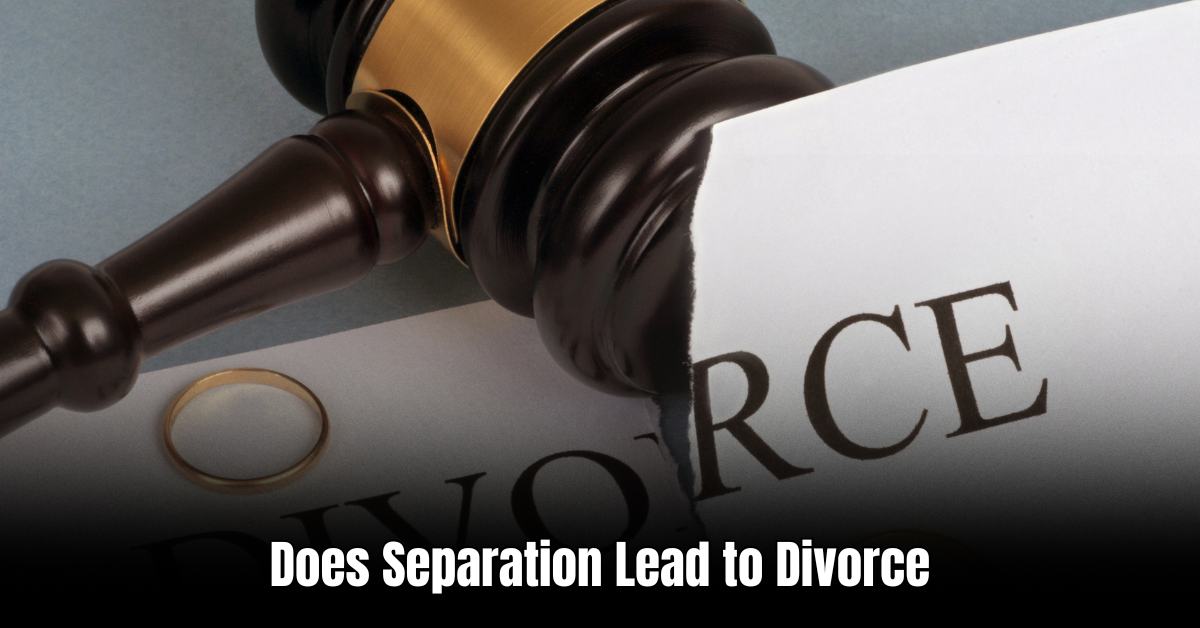Yes, separation often leads to divorce as it signifies a breakdown in the marital relationship. The decision to separate from a spouse is a critical turning point in any marriage.
It serves as a clear indication that the relationship has encountered significant challenges, leading many individuals to question whether divorce is an inevitable outcome. The process of separation involves living apart from one’s spouse, either temporarily or permanently, with the intention of reassessing the future of the marriage.
While separation does not guarantee divorce, it often amplifies existing issues and can act as a catalyst for a permanent split. This article explores the potential outcomes of separation and how it commonly leads to divorce due to the strain it places on the relationship. By understanding the factors involved, individuals can gain greater insight into the dynamics of separation and its impact on the longevity of a marriage.
The Impact Of Separation On Long-term Relationships
Emotional Consequences Of Separation
Separation can have profound emotional consequences for both partners involved and can greatly impact the future of their relationship. The feelings of loss, sadness, and betrayal experienced during this time can create significant barriers to reconciliation. It is important to acknowledge that the emotional toll of separation affects each individual differently.
For children, witnessing their parents separate can be a distressing experience. Their emotional well-being may be compromised, and they may struggle with feelings of blame and confusion. It is crucial for parents to provide stability, reassurance, and open communication to help children navigate through this challenging period.
During separation, couples may find it helpful to seek professional support, such as counseling or therapy, to process their emotions and work towards healing. By addressing these emotional consequences head-on, couples can better understand the impact of separation on their long-term relationship and make informed decisions about their future.
Factors That Influence The Outcome Of Separation
Separation can have various outcomes, and whether it ultimately leads to divorce depends on several factors.
Effective communication and conflict resolution are crucial in determining the outcome of a separation. Open and honest communication can help address issues, find common ground, and potentially reconcile differences.
Financial stability is another important factor. Financial strain can put immense pressure on a relationship, potentially leading to divorce. Conversely, if both partners can manage their finances and support each other, it may increase the chances of a successful reconciliation.
Support from friends and family plays a significant role as well. Having a strong support system can provide emotional support, guidance, and assistance during this challenging time, potentially increasing the likelihood of working through issues and avoiding divorce.
Understanding The Surprising Truth About Separation And Divorce
Research has shown that separation can indeed be a significant predictor of divorce. Numerous studies have found a strong correlation between the length of separation and the likelihood of divorce. Couples who undergo longer periods of separation are more likely to end their marriages in divorce.
But is separation always a sign of an imminent divorce? Not necessarily. The role of reconciliation is an important factor to consider. Many couples choose separation as a way to work on their marriage and address their issues. In fact, research has found that couples who actively seek reconciliation during separation have a higher chance of avoiding divorce.
Marriage counseling also plays a crucial role in divorce prevention. Couples who participate in counseling sessions during their separation have been found to have lower divorce rates compared to those who do not seek professional help.
Frequently Asked Questions: Does Separation Lead To Divorce
Does Separation Always Lead To Divorce?
Separation does not always lead to divorce. Couples may choose to reconcile or pursue legal separation instead.
How Long Should A Separation Last Before Divorce?
The length of separation before divorce varies based on individual circumstances, but some states require a minimum period of separation.
Can Separation Help Save A Marriage?
Separation can provide the space and time needed for couples to reflect, seek counseling, and work on their marriage issues.
What Are The Potential Benefits Of Separation?
Separation can offer a fresh perspective, allow personal growth, promote self-reflection, and potentially reignite the spark in a troubled marriage.
Can Legal Separation Lead To A Better Divorce Outcome?
Legal separation gives couples the opportunity to determine financial arrangements, child custody, and property division, potentially leading to a smoother divorce process.
How Can Couples Navigate Separation Without Damaging The Relationship Further?
Seeking professional guidance, maintaining open communication, setting boundaries, and focusing on personal growth can help couples navigate separation amicably.
Conclusion
In sum, while separation may be seen as a last resort to salvage a failing marriage, it does not necessarily guarantee the end result of divorce. Every relationship is unique, and the decision to separate should be approached with careful consideration.
Communication, therapy, and commitment to working through issues can often lead to reconciliation rather than dissolution. Ultimately, the outcome depends on the individuals involved and their willingness to make necessary changes.
Ismail Hossain is the founder of Law Advised. He is an Divorce, Separation, marriage lawyer. Follow him.





Leave a Reply